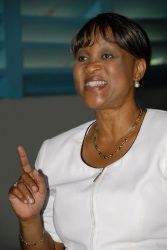Help Parents Build Framework for Learning
KINGSTON, Jamaica – A university lecturer has opined that some educators are expecting parents to carry out functions that are outside their capacity to do.
Joan Spencer Ernandez, Lecturer in the Department of Educational Studies at The University of the West Indies argues: “There are some parents who are not at the educational level of their children, therefore, how can teachers expect them to assist with homework?” She said some of the assignments students receive are complex; and, sometimes, are beyond the competence of their parents.

Joan Spencer Ernandez, Lecturer in the Department of Educational Studies at the University of the West Indies, Mona.
Mrs. Spencer Ernandez, who is specialist in Language and Literacy and has conducted extensive research in the area over many years, made the point recently during a series of literacy workshops with members of academic staff at six rural-based high schools participating in the Centres of Excellence programme which is funded equally by the Jamaica National Building Society and The Victoria Mutual Building Society through their joint Mutual Building Societies Foundation.
The workshops were geared at assisting teachers to build capacity in assessing students’ literacy and numeracy levels and to apply the appropriate intervention strategies to improve learning.
However, Mrs. Spencer Ernandez stated: “I am not saying that parents should not share the responsibility for their children’s education; but, rather that, they provide a structured home environment and put monitoring mechanisms in place to ensure that homework is completed and learning is encouraged.”
Llewelyn Bailey, Programme Manager of the MBSF supported this viewpoint and added that a component of the Centres of Excellence programme is to encourage parents to provide a framework for learning that goes beyond just contributing to their children’s financial welfare.
The $100 million Centres of Excellence programme is aimed at transforming the delivery of education in six rural high schools. The six schools are: Mile Gully and Porus High in Manchester; McGrath High in Linstead, St. Catherine; Green Pond High in St. James; Seaforth High in St. Thomas; and Godfrey Stewart in Westmoreland. The programme, which began in 2008, will end in 2012.
“The programme maintains that parents are important; however, they often feel alienated from the educational system, especially at the secondary level, because some see themselves as being, ill-equipped, to contribute to their children’s education,” Mr. Bailey said. “Some parents are concerned about how to navigate the school environment.”
One way to deal with this, added Dawn Sewell-Lawson, Assistant Programme Manager, is to create school environments that are encouraging and welcoming to parental involvement. She noted: “Schools can assist to train and socialize parents to carry on activities such as conversations about a news item, with their children. This nurtures a child’s learning capacity and improves parents’ involvement in the educational process, and will in turn improve student outcomes.”

Joan Spencer Ernandez, Lecturer in the Department of Educational Studies at The University of the West Indies, Mona, has a discussion with a Grade Seven Student about his Grade Six Achievement Test performance during a two-day Literacy Workshop at the Seaforth High School recently.
“The school leadership needs to find ways to engage parents in the school management process. And, this is one of the areas in which the guidance and counseling units within the schools can play an important role,” Mr. Bailey added. “It’s an area that involves being aware of the critical role of parents; understanding people and their environment, and having a willingness to actively engage them.” Of equal importance, he said, is the need for parents to recognize their roles as critical partners in their children’s education, and in the running of the school.
“The focus on parents as critical to the education process is just another way that JNBS and VMBS show the ‘family-focus’ that we are known for,” he said.

